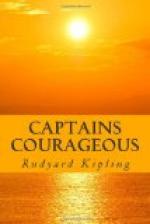“‘Sufferin’ Christianity!’ sez Counahan (he always said that whin his pumps sucked an’ he was not feelin’ good)—’Sufferin’ Christianity!’ he sez, ‘where am I at?’
“‘Thirty-five mile west-sou’west o’ Cape Clear,’ sez the tramp, ’if that’s any consolation to you.’
“Counahan fetched wan jump, four feet sivin inches, measured by the cook.
“‘Consolation!’ sez he, bould as brass. ’D’ye take me fer a dialect? Thirty-five mile from Cape Clear, an’ fourteen days from Boston Light. Sufferin’ Christianity, ‘tis a record, an’ by the same token I’ve a mother to Skibbereen!’ Think av ut! The gall av um! But ye see he could niver keep things sep’rate.
“The crew was mostly Cork an’ Kerry men, barrin’ one Marylander that wanted to go back, but they called him a mutineer, an’ they ran the ould Marilla into Skibbereen, an’ they had an illigant time visitin’ around with frinds on the ould sod fer a week. Thin they wint back, an’ it cost ’em two an’ thirty days to beat to the Banks again. ‘Twas gettin’ on towards fall, and grub was low, so Counahan ran her back to Boston, wid no more bones to ut.”
“And what did the firm say?” Harvey demanded.
“Fwhat could they? The fish was on the Banks, an’ Counahan was at T-wharf talkin’ av his record trip east! They tuk their satisfaction out av that, an’ ut all came av not keepin’ the crew and the rum sep’rate in the first place; an’ confusin’ Skibbereen wid ’Queereau, in the second. Counahan the Navigator, rest his sowl! He was an imprompju citizen!”
“Once I was in the Lucy Holmes,” said Manuel, in his gentle voice. “They not want any of her feesh in Gloucester. Eh, wha-at? Give us no price. So we go across the water, and think to sell to some Fayal man. Then it blow fresh, and we cannot see well. Eh, wha-at? Then it blow some more fresh, and we go down below and drive very fast—no one know where. By and by we see a land, and it get some hot. Then come two, three nigger in a brick. Eh, wha-at? We ask where we are, and they say—now, what you all think?”
“Grand Canary,” said Disko, after a moment. Manuel shook his head, smiling.
“Blanco,” said Tom Platt.
“No. Worse than that. We was below Bezagos, and the brick she was from Liberia! So we sell our feesh there! Not bad, so? Eh, wha-at?”
“Can a schooner like this go right across to Africa?” said Harvey.
“Go araound the Horn ef there’s anythin’ worth goin’ fer, and the grub holds aout,” said Disko. “My father he run his packet, an’ she was a kind o’ pinkey, abaout fifty ton, I guess,—the Rupert,—he run her over to Greenland’s icy mountains the year ha’af our fleet was tryin’ after cod there. An’ what’s more, he took my mother along with him,—to show her haow the money was earned, I presoom,—an’ they was all iced up, an’ I was born at Disko. Don’t remember nothin’ abaout it, o’ course. We come back when the ice eased in the spring, but they named me fer the place. Kinder mean trick to put up on a baby, but we’re all baound to make mistakes in aour lives.”




